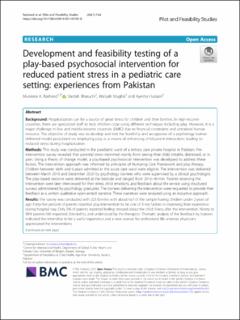| dc.contributor.author | Rasheed, Muneera Abdul | |
| dc.contributor.author | Bharuchi, Vardah | |
| dc.contributor.author | Mughis, Waliyah | |
| dc.contributor.author | Hussain, Ayesha | |
| dc.date.accessioned | 2022-02-21T14:34:30Z | |
| dc.date.available | 2022-02-21T14:34:30Z | |
| dc.date.created | 2022-01-19T09:17:50Z | |
| dc.date.issued | 2021 | |
| dc.identifier.issn | 2055-5784 | |
| dc.identifier.uri | https://hdl.handle.net/11250/2980601 | |
| dc.description.abstract | Background
Hospitalization can be a source of great stress for children and their families. In high-income countries, there are specialized staff to help children cope using different techniques including play. However, it is a major challenge in low and middle-income countries (LMIC) due to financial constraints and untrained human resource. The objective of study was to develop and test the feasibility and acceptance of a psychology trainee-delivered model postulated on employing play as a means of enhancing child-parent interactions leading to reduced stress during hospitalization.
Methods
This study was conducted in the paediatric ward of a tertiary care private hospital in Pakistan. Pre-intervention survey revealed that parental stress stemmed mainly from seeing their child irritable, distressed, or in pain. Using a theory of change model, a play-based psychosocial intervention was developed to address these factors. The intervention approach was informed by principles of Nurturing Care Framework and play therapy. Children between birth and 6 years admitted in the acute care ward were eligible. The intervention was delivered between March 2019 and December 2020 by psychology trainees who were supervised by a clinical psychologist. The play-based sessions were delivered at the bedside and ranged from 20 to 40 min. Parents receiving the intervention were later interviewed for their stress, child emotions, and feedback about the service using structured surveys administered by psychology graduates. The trainees delivering the intervention were requested to provide their feedback as a written qualitative open-ended narrative. These narratives were analyzed using an inductive approach.
Results
The survey was conducted with 223 families with about half of the sample having children under 2 years of age. Forty-five percent of parents reported play intervention to be one of 3 key factors in improving their experience during hospital stay. Only 5% of parents reported feeling stressed about the child illness after the intervention. Ninety to 96% parents felt respected, listened to, and understood by the therapists. Thematic analysis of the feedback by trainees indicated the internship to be a useful experience and a new avenue for professional life whereas physicians appreciated the interventions.
Conclusions
The authors conclude that psychology trainees can feasibly deliver a play-based intervention under supervision for reduced stress in children and their parents during hospitalization with mutual benefits. | en_US |
| dc.language.iso | eng | en_US |
| dc.publisher | BMC | en_US |
| dc.rights | Navngivelse 4.0 Internasjonal | * |
| dc.rights.uri | http://creativecommons.org/licenses/by/4.0/deed.no | * |
| dc.title | Development and feasibility testing of a play-based psychosocial intervention for reduced patient stress in a pediatric care setting: experiences from Pakistan | en_US |
| dc.type | Journal article | en_US |
| dc.type | Peer reviewed | en_US |
| dc.description.version | publishedVersion | en_US |
| dc.rights.holder | Copyright The Author(s) 2021 | en_US |
| dc.source.articlenumber | 63 | en_US |
| cristin.ispublished | true | |
| cristin.fulltext | original | |
| cristin.qualitycode | 1 | |
| dc.identifier.doi | 10.1186/s40814-021-00781-8 | |
| dc.identifier.cristin | 1984296 | |
| dc.source.journal | BMC Pilot and Feasibility Studies | en_US |
| dc.identifier.citation | BMC Pilot and Feasibility Studies. 2021, 7, 63. | en_US |
| dc.source.volume | 7 | en_US |

